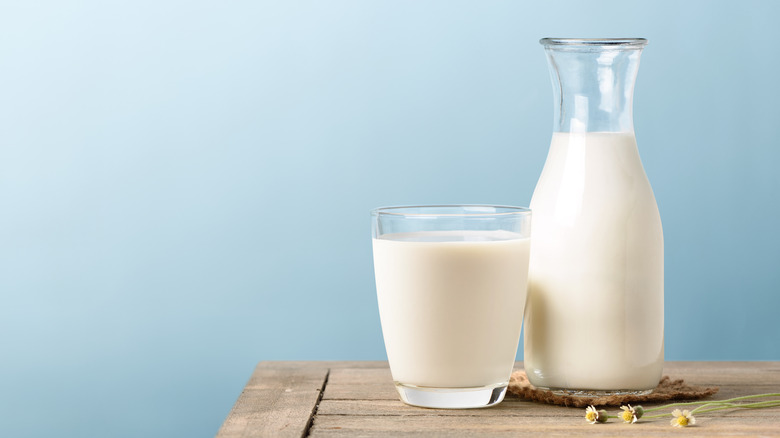Should You Buy Milk Fortified With Vitamin D?
Chances are good you should be drinking more milk, and if you're in the U.S., you should have no trouble finding it. Having a glass of milk is the easiest way to meet the daily minimum of two cups of dairy suggested by the 2020-2025 Official Dietary Guidelines for Americans, but The United States Department of Agriculture shares milk isn't showing up on dining tables the way it once was. As NPR reports, Americans drank roughly 12 gallons less of the dairy product in 2017 than in 1970. And our milk consumption has remained so low that the "Got Milk?" campaign (which was discontinued in 2014, per CBS News) was resurrected in effort to try and get Americans back on the milk train (via The American Dairy Association).
And if you want to heed health officials' advice by adding more milk to your diet, it helps if your milk is fortified with vitamin D. While this might sound like a new concept, fortified milk has actually been around since the 1930s — and you've more than likely drank it before (via Global Health Now). But what is it exactly, and why should you stock your fridge with it?
Milk with vitamin D has the nutritional edge
While the dairy product is known for its significant calcium content, Global Health Now reports cow's milk does not naturally have vitamin D in it. So how did the nutrient end up on our milk gallons' nutrition labels? According to the outlet, in the 1930s the U.S.'s children were faced with a rickets outbreak, a disease brought on by not getting enough vitamin D. To solve this nationwide health problem, American officials decided to fortify milk with the nutrient. However, even though rickets is no longer a widespread disease, over 90% of the milk on our store shelves today is still fortified (via Cooking Light).
And the U.S.'s decision to keep producing this type of milk makes sense because fortified milk isn't just good for giving you an extra dose of vitamin D. According to The Bone Health and Osteoporosis Foundation, vitamin D actually helps your body absorb calcium more efficiently. Healthline also reports that this milk has 7% more vitamin A than regular milk, so fortified milk is more nutritious. Even though milk fortified with vitamin D was originally created to fend off an outbreak of rickets, it's still a supercharged way to get the most benefit from the dairy product — which means you should always plan to pick it up when grocery shopping. And if the thought of gulping down milk doesn't pique your interest, these dairy-rich cheddar and gruyere grilled-cheese sandwiches surely will.

